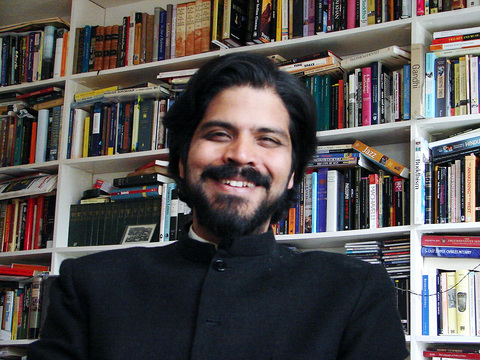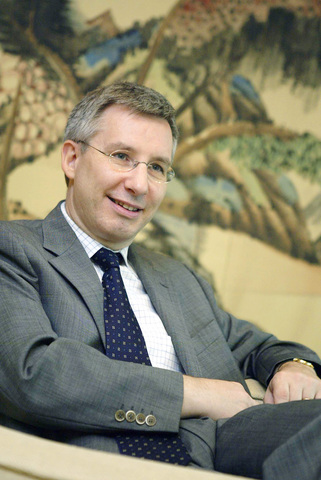Lung Ying-tai (龍應台) is disillusioned with Taiwan's political scene. Fed up with the constant partisan bickering and lunch-box battles in the legislature, the founder and president of the Lung Ying-tai Cultural Foundation (龍應台文化基金會) — a non-governmental organization (NGO) based in Taipei — hopes to provide an antidote to Taiwan's political chaos through hosting a series of lectures called Taipei Salon (台北沙龍). The lectures are conducted in English.
Begun last year, Lung's idea combines the French institution of literary salons with modern ideas on how to create a civil society — where an informed citizenry is empowered to make intelligent voting decisions, participate in politics and hold government and industry to account.
"[We] want to have an impact on society through intellectual discussion ... away from [the] narrow path of political fighting or reform," Lung said in an interview.

Creating a civil society is something that Lung knows a lot about. Appointed Taipei City's first cultural csar in 1999, during her four-year term she designed and implemented a cultural policy that increased the visibility of the arts in the city. With 15 book titles to her name, the current chair of arts and humanities at Tsing Hua University frequently publishes critical essays in European magazines and newspapers on both sides of the Taiwan Strait.
This month's lectures begin tomorrow with Jean-Claude Poimboeuf, Director of French Institute in Taipei, who will discuss how the French maintain their unique cultural identity in the age of globalization.
On March 17, Pankaj Mishra, a novelist and contributor to the New York Times, will talk about India's path to democracy. This month's series will end on March 24 with Julian Nida-Ruemelin — professor of political theory and philosophy at the University of Munich and a former minister of culture — who will discuss the relationship between globalization and democracy.

PHOTOS COURTESY OF LUNG yINGTAI CULTURAL FOUNDATION
Past speakers include David Plott, the former editor-in-chief of The Far Eastern Economic Review and current professor of journalism at the University of Hong Kong, and Jurgen Gerbig, Director of the German Cultural Center in Taipei.
By conducting the lectures in English, Lung hopes that foreigners will attend the lectures and participate in the discussions.
"I suspect [expats] have been closed up — because of the language barrier — in their own circles, which is not fair because they are citizens of the city," she said. "But so far we have not been able to reach the expat community because we don't know where they are."
Though foreigners are invited to participate, the youth of Taiwan are the real focus of Lung's salon.
"We want to get in touch with the younger generation," she said. "We are disappointed with anyone over 40 — so we decided to carry on a dialogue with people under 40," she added jokingly.
"We want to … cultivate the minds of the younger generation so that they are open-minded ... are concerned about global issues [and] ... have compassion for the weaker, whether in terms of income, resources, or in environmental areas — global citizenship in other words.
Though a tall order, Lung has found remarkable success with Taipei Salon. The last two lectures saw the auditorium at Yuehan Hall (月涵堂) packed to capacity with everyone from high school students to young professionals.
In addition to Taipei Salon, Lung's foundation has also set up a Thinkers Salon (思沙龍), a club with seminars conducted in Chinese that exposes participants to different cultures throughout the world. Under the title "What you do not know" (你所不知道的), it has covered topics such as Latin America, North and South Korea and the conflicts between the Israelis and Palestinians.
By doing so, Lung believes the youth of Taiwan will come to see they have the power to create an efficient civil society, thus furthering the island's democratization.
"We have to … focus on the younger generation and that kind of idea leads us to do what we are doing now," she said.

Mongolian influencer Anudari Daarya looks effortlessly glamorous and carefree in her social media posts — but the classically trained pianist’s road to acceptance as a transgender artist has been anything but easy. She is one of a growing number of Mongolian LGBTQ youth challenging stereotypes and fighting for acceptance through media representation in the socially conservative country. LGBTQ Mongolians often hide their identities from their employers and colleagues for fear of discrimination, with a survey by the non-profit LGBT Centre Mongolia showing that only 20 percent of people felt comfortable coming out at work. Daarya, 25, said she has faced discrimination since she

It is one of the more remarkable facts of Taiwan history that it was never occupied or claimed by any of the numerous kingdoms of southern China — Han or otherwise — that lay just across the water from it. None of their brilliant ministers ever discovered that Taiwan was a “core interest” of the state whose annexation was “inevitable.” As Paul Kua notes in an excellent monograph laying out how the Portuguese gave Taiwan the name “Formosa,” the first Europeans to express an interest in occupying Taiwan were the Spanish. Tonio Andrade in his seminal work, How Taiwan Became Chinese,

April 21 to April 27 Hsieh Er’s (謝娥) political fortunes were rising fast after she got out of jail and joined the Chinese Nationalist Party (KMT) in December 1945. Not only did she hold key positions in various committees, she was elected the only woman on the Taipei City Council and headed to Nanjing in 1946 as the sole Taiwanese female representative to the National Constituent Assembly. With the support of first lady Soong May-ling (宋美齡), she started the Taipei Women’s Association and Taiwan Provincial Women’s Association, where she

More than 75 years after the publication of Nineteen Eighty-Four, the Orwellian phrase “Big Brother is watching you” has become so familiar to most of the Taiwanese public that even those who haven’t read the novel recognize it. That phrase has now been given a new look by amateur translator Tsiu Ing-sing (周盈成), who recently completed the first full Taiwanese translation of George Orwell’s dystopian classic. Tsiu — who completed the nearly 160,000-word project in his spare time over four years — said his goal was to “prove it possible” that foreign literature could be rendered in Taiwanese. The translation is part of